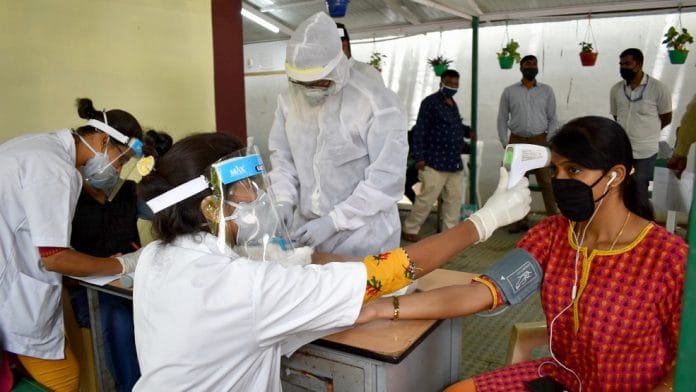New Delhi: The Modi government is eyeing QR and bar codes as possible tools to check the alleged black marketing of key Covid-19 drugs, ThePrint has learnt.
The move follows complaints that drugs such as remdesivir, tocilizumab and favipiravir — investigational medicines allowed for emergency use among Covid-19 patients — are being sold at over 10 times their price on the black market.
While the government has increased vigilance on the sales of the drugs in light of such complaints, the Department of Pharmaceuticals (DoP), along with its arm, the National Pharmaceutical Pricing Authority (NPPA), is trying to find ways to curb their leak into the black market.
The use of QR codes — the seemingly pixellated squares packed with certain information that are now commonly used for digital payments, among other things — and barcodes is meant to help track and trace the sales of drugs and identify leaks in the supply chain, sources in the government said.
“We are considering several other ideas apart from the proposal of manufacturers putting a unique serial number on the vials along a bar or QR code,” said a DoP officer.
“We will need a solid plan to curb black marketing, otherwise it may pose a challenge in the distribution of Covid-19 vaccines too, as and when it arrives,” the officer added.
Explaining how the codes may be deployed, the officer said they “can be scanned at various points of the supply chain until the product reaches the final consumer”.
“Each vial can be tracked and distributors, companies and hospitals could be held accountable,” the officer added, saying “the proposal is still at a nascent stage”.
“Before proceeding, we need to understand the cost implication of executing the idea on the MRP of the drug and the time needed for execution by companies. It should not delay the manufacturing time,” the officer said.
An industry expert said “the approximate cost of putting a barcode or QR code on a vial is between 10-20 paise per unit”. However, it depends on whether the manufacturer has the machine installed or needs to make a fresh investment, the expert added.
Also Read: Parliamentary panel flags black-marketing of remdesivir, govt says ‘taking action’
Industry backs QR, barcode security
A proposal to mandate barcodes and QR codes on all medicines to check counterfeits has been on the anvil for at least 10 years. The latest proposal, however, focuses on Covid-19 products alone, the aforementioned government officer clarified.
“All government departments, especially pharmaceuticals and health ministry, have been regularly receiving suggestions from public health experts and individual firms,” the officer said.
“We are corroborating the good ideas and taking cues,” the officer added, saying the suggestion to adopt a traceability method is being pushed aggressively by experts and individual firms.
Also Read: After complaint, Modi govt asks states to keep vigil to stop ‘black-marketing’ of remdesivir
Use of Aadhaar card advised
On 7 July, the Drugs Controller General of India (DCGI), India’s apex medicine watchdog, alerted the NPPA and state drug controllers to complaints of remdesivir black marketing and asked them to keep vigil.
The DCGI directive followed a complaint from LocalCircles — a community social media and polling firm — about black marketing and over-pricing of remdesivir by certain “unscrupulous persons”.
After the government took note of their complaint, LocalCircles CEO Sachin Taparia shot off another letter on 18 July to the DoP, the NPPA, the DCGI, the health secretary and the cabinet secretary, suggesting the use of bar codes to address the problem.
In the letter, accessed by ThePrint, Taparia has suggested that “a unique serial number must be mandatorily put on every vial by the manufacturer along with a barcode and the barcode must be scanned at every step of the supply chain i.e. shipping from manufacturer, receipt at distributor, to receipt at the stockist/retailer and finally when the stock is issued by the retailer to the hospital/patient”.
He has said that “the final issuance should be such that it requires the Aadhaar number of the actual patient and finally a digital signature by the doctor administering the drug or the vaccine”.
Also Read: India could be producing over 20,000 vials of Remdesivir per day by month-end: Govt data







Very good Information .keep it